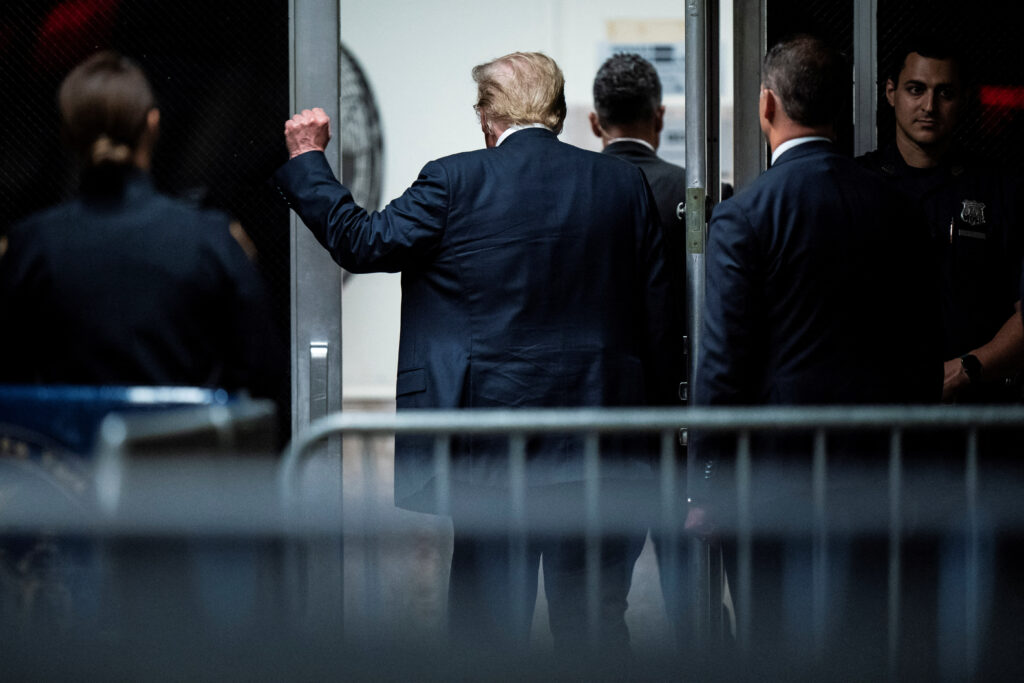A presidential election featuring two unpopular gerontocrats, one of whom has just been convicted by a jury of his peers in a sex-and-hush-money scandal; Supreme Court justices accused of corrupt behaviour and political extremism; a yawning budget deficit; a bipartisan commitment to winner-picking import-substitution industrial policy: the whiff of a banana republic has never seemed so strong in the United States.
The consensus of analysts seems to be that Donald Trump’s criminal conviction is unlikely to present more than a speed bump on the road to the White House. Not only can he appeal, delaying the final resolution of the case for months if not years, but enough of the country probably doesn’t care if their standard-bearer is a felon. Joe Biden may yet triumph in November, but he is one of the most unpopular presidents since records began and Trump has a considerable base of unshakeable — critics might say fanatical — supporters who appear not for turning. Biden’s handling of the Gaza conflict has soured much of his base, including the substantial Arab-American communities that make up a considerable voter bloc in crucial states in the Midwest, like Michigan.
On the international economic front, in any case, the difference between the two candidates is largely cosmetic. Biden and Trump are running on a unity ticket when it comes to the overall economic posture of the United States towards the rest of the world. They both resent the loss of economic leadership due to the rise of Asia, and particularly China, and they are both committed to using classic protectionist tools to restore American pre-eminence. Each has focused on an emblematic ‘20th century’ sector: for Trump, it was steel; for Biden, it has been the automotive industry.
The recent announcement that the United States would quadruple the tariff level on imported Chinese electric vehicles (EVs) is, on the face of it, a symbolic gesture: China exports very few EVs to the United States at this stage. But if it is a symbol, it is a potent one in an election year. Biden’s understanding of political calculus is undoubtedly tied to his successful re-election as Vice-President in 2012, due in part to the fact that the Republican candidate for President, Mitt Romney, had advocated for managed bankruptcy for American car manufacturers during the 2008 financial crisis, while Barack Obama campaigned as the president who kept Detroit alive.
American industrial policy has the potential to reshape industries in Asia and around the world. The Obama and early Trump-era anti-dumping duties on South Korean washing machines led to a relocation of their production to China — and then when China was targeted, to Vietnam and Thailand. Trump’s later global tariff increases on washing machines did lead to onshoring, but that meant substantial price increases for American consumers. Biden is hoping, apparently, that the EV tariffs will decimate Chinese manufacturing in this sector, but it is not clear that the United States will be the winner, particularly if the European Union and China are able to work out a modus vivendi.
As Gary Hufbauer observes in this week’s lead article, this provides a diplomatic opening for China, if Beijing is smart enough to play its cards right. Foreign investment by Chinese automakers and battery manufacturers in countries friendly to the United States — already taking place in Mexico and France — would place Washington in a tough spot, forcing it to choose between further protecting its own domestic industry and antagonising allies.
Throughout the twentieth century, the world came to expect and tolerate a certain level of hypocrisy from the last remaining superpower. Certainly, it underwrote the post-war global trading system, pushed countries around the world to open their markets and provided a relatively stable currency to lubricate the flow of international trade and capital. But it was never a paragon of liberal virtue, frequently intervening in its own domestic markets to protect politically sensitive sectors and strong-arming allies like Japan into accepting export restraints to protect the profits of American firms and the revaluation of the yen against the dollar.
By and large the world accepted these hypocrisies as the price to pay for a relatively stable and liberalising global economy. What has changed in the United States is not so much the domestic constituency for protectionism, which has always been influential, but the collapse of the bipartisan intellectual consensus on the need for the United States to promote and protect the global trading rules. With that consensus in tatters, there is little to restrain politicians from indulging in the most damaging kind of industrial intervention, while — even worse — making sure that the beleaguered World Trade Organization falls further into irrelevance.
Worse still, the specific form that industrial policy is taking in the United States threatens to make the problem of climate change harder to solve. This need not have been the case: some kinds of industrial policy, like China’s subsidy regime for solar technology, may be distorting but has undeniably contributed to the plummeting cost of renewable energy, with spillover effects for the rest of the world. Increased trade barriers on clean energy technology, as the Biden administration seems to want, will make the fight against climate change harder and more costly.
Hufbauer’s sombre warning is that regardless of how the rest of the world responds to this American dynamic, ‘history will see the Trump–Biden era as a turning point in world economic affairs’: either because the United States will become increasingly isolated from it or, in the worst case scenario, because of a general collapse of the international economic order.
The EAF Editorial Board is located in the Crawford School of Public Policy, College of Asia and the Pacific, The Australian National University.

